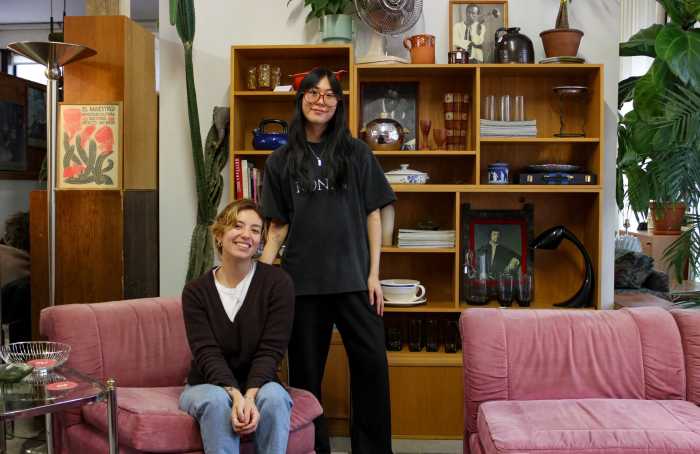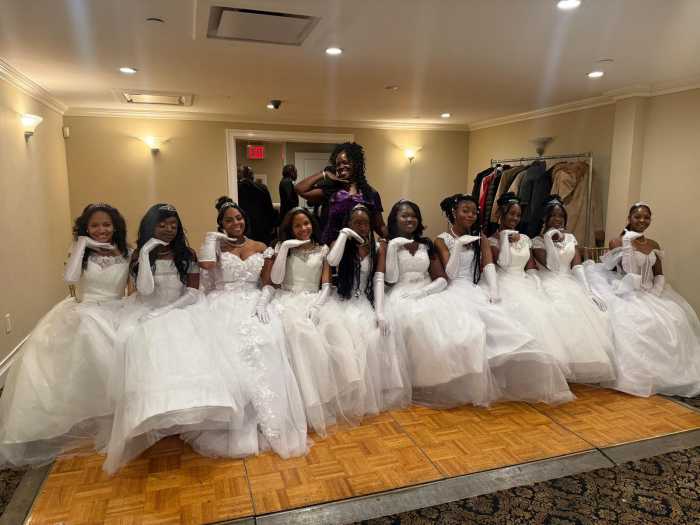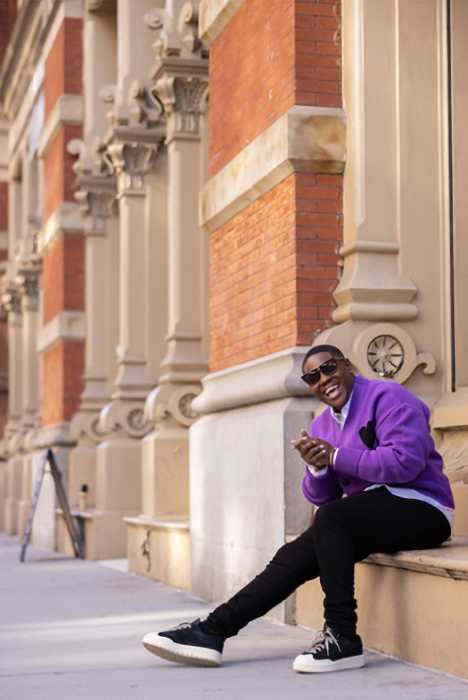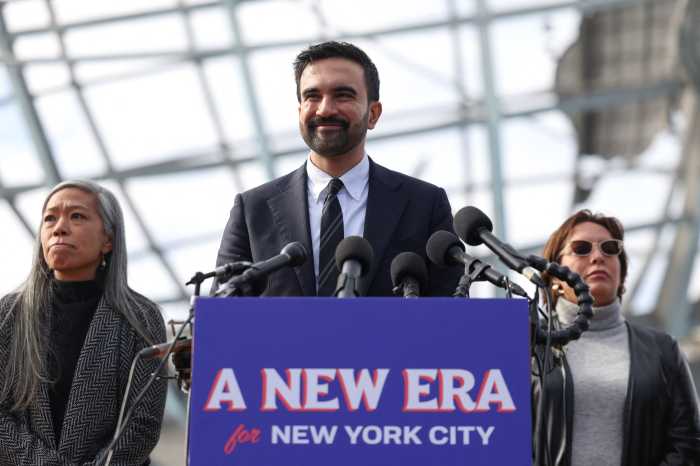Dorothy Bishop as Renée Fleming. | COURTESY: DOROTHY BISHOP
BY DAVID NOH | Once upon a time, in the distant BR (Before RuPaul) era, real women ruled our hearts in gay dives. Barbra Streisand at the Lion, Bette Midler at the Continental Baths, Ellen Greene at Reno Sweeney made us swoon, cocktails in hand, with their big, actual voices, talent, and camp sensibilities. Carrying on the sorely missed tradition of those ladies is Dorothy Bishop with her dazzlingly versatile, hilariously rambunctious show “The Dozen Divas,” which she is doing again on March 27 at her very welcome home, the Metropolitan Room (34 W. 22nd St.; metropolitanroom.com).
With a mind-boggling array of wigs and even more mind-boggling quick changes onstage, she effervescently evokes, first, Joan Rivers in heaven (a bold choice, indeed), and then moves on to Kim Kardashian, replete with her infamous Paper ass shot, and the really big guns: Barbra, Liza, Judy, Cher, Madonna, Shirley Bassey, Sarah Brightman, Renée Fleming, Stevie Nicks, and, oh yeah, Sarah Palin.
Asked who her favorite diva was, Bishop responded, “Oddly, Stevie Nicks. I am a professionally trained opera singer from Yale so she is the least like my real voice. But I grew up with Fleetwood Mac and could just imitate her easily. And I love her and her music and her goth, witchy ways. It is one of my favorite moments in the show. ‘Landslide’ is my absolute favorite song in the world and I want it sung in my funeral. And, an aside, my sweet mom — who passed a year and a half ago — used to come hear me sing with this rock band in high school. We were loud and not very good, but I sang ‘Landslide.’ She loved it and used to ask me to sing it, this woman from 1950s music, so I just loved it that she liked Stevie.
A cabaret star’s many identities; Japanese film goddesses
“My second favorite is Renée Fleming. I get to use my pipes! And I am proud that I am the only Renée impersonator. Of course I do Renée singing jazz. I wouldn’t dare try to impersonate Renée singing ‘Rusalka.’ If I could do that, I would be at the Met, not the Metropolitan Room.
“I still enjoy doing the classics such as Barbra, Liza, Cher, Dolly, Shirley Bassey — and it’s fun because I get to put my own spin on them. But Renée and Stevie are super special to me.”
Bishop first made her name with gay audiences at the club Splash, which she says was “an evolution of me headlining on cruise ships. I started out as kind of a copy of Sarah Brightman but then my humor just had to be in the show so I started making it funny, but still sang some beautiful pop opera versions of ‘Un bel di,’ ‘Nessun Dorma,’ ‘Carmen.’ They wanted me to incorporate the gorgeous go-go boys. So I would be singing disco ‘Nessun Dorma’ or the ‘Queen of the Night.’ And these two boys would just step out on stage in G-strings and dance. I was only supposed to have two. But somehow communication would get lost and I would sometimes have one and one time I had four. The audiences were fabulous. They would set up cocktail tables and there was no cover. Real old-school night club gig. I miss it!
“That is where I met Lady Bunny — who later used me in her Sarah Palin spoof — Hedda Lettuce, and Sherry Vine. Such great performers and they continue to support me today. I mean, they don’t send money [laughs], they are just great people, professional and fun.”
Asked she ever felt discrimination from gay audiences as a straight female performer, Bishop said, “At Splash, in the beginning, the gays were confused. I was something different. A biological woman who was basically doing drag and singing opera and dance techno opera and doing comedy. But the great thing about the gays is if something is unique and good and they like it, they embrace it. I am happy to say they do seem to have figured me out.
“Sometimes the straight crowds are harder. They were tough on the ships. I was singing opera, classic pop, and Broadway. I was very glamorous and not a young woman, very strong. People aren’t used to seeing a stronger woman — not so young — and so there was some resistance. I had to get very tough. This is why I love Madonna! She has a lot to say about older women. Older women staying sexy, the value of the more experienced diva, older women being relevant and not putting up with sexist ageism. If my show has a serious theme, this is it. All my divas are older and still fabulous performers and offer so much to the world. I am not mean to them. I tease a little but mostly I feel I honor them in a fun way. I love all my divas… except Sarah Palin. But I even like her a little… and she’s not really a diva.”
In the often scattershot world of cabaret, it’s nice to know that Bishop has found a real home at the Metropolitan Room: “[Owners] Bernie and Joanne Furshpan have been so good to me and really believe in the show. In this day and age, if a small show doesn’t sell out, they will cancel you. Bernie has kept this show running despite the sometimes lower attendance. But the audience is growing. I mean this is what any small business needs — time to catch on — and it is. If Bernie was not behind it and it was all about profit, I would be back in a basement somewhere.”
Bishop’s favorite opera singer is Maria Callas, and she toured for14 months in the play about her, “Master Class,” with no less than Faye Dunaway: “Faye, like Callas and Madonna, was steely strong, not always perfect, and fierce. Very old Hollywood. She would not really hang out with us much. I was the understudy for the role of Sharon and had to sing ‘Vieni T’affretta’ from ‘Macbeth.’ I didn’t go on until the last two months. Faye would call me in her dressing room and would be in character as Maria. She was stunning and giant — she had that energy, the star quality thing. She was mesmerizing and scary and still gorgeous, but she never really knew my name. She called me Eleanor and would say, ‘Eleanor, you look too pretty. Get out!’ And then, as I got to the door, shaking in my character shoes, she would say in a sweet voice, ‘Dorothy?’ ‘Yes ma’am?’ ‘Have a great show,’ and she would wink. I guess that’s what you call method acting? Well it’s definitely what you call a diva.”
Originally from Jacksonville, Florida, Bishop attended Florida State, went to graduate school at Yale, and then came to New York, where she worked regional operas. With critic James Jorden, who directs her show, she started a company, Parterre Productions. “But as I got closer to 40,” Bishop said, “I got really unhappy because I wasn’t working enough. I was basically a secretary paying for voice lessons, so one day I belted ‘I Dreamed a Dream’ for my teacher at the time, Bill Schuman, and he said, ‘Dear if you can belt like that, get the hell out of opera and go audition for theater.’
“So I did and I got a lot of call backs and an agent, but I was still frustrated. So I built my first cabaret show with Phil Hall, videotaped it, and sent it to ships and got hired as a full time entertainer. I saw the world. Some places I never want to see again — North Africa, the UAE, and the Caribbean, my least favorite — but South America, Buenos Aires, India I loved. I sang with some of the best bands in the world — especially Cunard. It was stressful, though. You had one hour. If your charts weren’t great, the band got mad. On some other lines — I won’t say which — the bands were horrible.”
Bishop is currently “still single. Oddly enough, I can’t seem to find a man who wants to date 12 different women at once. Right now the love of my life is my mini Chihuahua, Luther, whom I rescued off the streets of Puerto Vallarta while I was on tour with the show last spring. He sings in my act. He was sick on the streets, I nursed him back to health, and I was warming up backstage and he just started singing with me! And he is so cute. You have to come to my show to see him!”
Shirley Yamaguchi.
Starting March 21, Japan Society is screening “The Most Beautiful: The War Films of Shirley Yamaguchi and Setsuko Hara” (337 E. 47th St., through Apr. 4; japansociety.org). These two actresses, among the most lovely and iconic of all Japanese film stars, were both born in 1920 and became famous in propaganda movies of the China and Pacific wars. As the program notes state: “This series illustrates how their respective roles on the silver screen transformed along with Japan itself — from young maidens serving an empire allied with Nazi Germany to mature women walking different paths in a defeated nation promoting democracy under American hegemony.”
Hara is considered the Garbo of Japan, not only for her luminous work for directors ranging from Yasujirô Ozu to Akira Kurosawa to Mikio Naruse, but also for her mystery. She never married, was billed “the Eternal Virgin,” and lives today in seclusion in Kamakura, refusing all requests for photographs or interviews.
Hara may have made the more important films, but it was Yamaguchi who led the really intriguing life, indeed, the stuff of movies. She was born to Japanese parents in Manchuria and was fluent in Mandarin. A popular singer, as well, she made her film debut in 1938 under the Chinese name Li Xianglan, and was considered an ambassador of Japan-Manchuria goodwill. In “China Nights” (1940), she plays a Chinese woman who hates the Japanese but falls in love with a Japanese man. In one scene, she is slapped by the man and reacts with gratitude rather than hatred. This scene repulsed its Chinese audience, and one of her songs “Souzhou Serenade” has been banned in China to this day. Yamaguchi apologized for this movie after the war, citing her youth and ignorance.
In fact, the Chinese government arrested her on charges of treason for collaboration with the Japanese in her film work, and it was her birth certificate that saved her, proving she was not a Chinese national. In 1946, she moved to Japan and, under her birth name, Yoshiko Yamaguchi, made movies with directors including Kurosawa. When she took on roles in Hollywood and on Broadway, in the musical “Shangri-La,” she changed her first name to Shirley. Married for five years in the 1950s to sculptor Isamu Noguchi, Yamaguchi later married Japanese diplomat Hiroshi Otaka, who died in 2001.
A member of Japan’s parliament for 18 years beginning in 1974, Yamaguchi was one of that nation’s first prominent citizens to address its brutality during wartime occupation, advocating reparations for Korean “comfort women” forced into sex slavery by the Japanese military. Though she long harbored guilt over her role in Japanese propaganda films distributed in wartime China, her music always remained popular there and superstar Jacky Cheung had a big hit with a song with her Chinese name as its title. Yamaguchi died last year in Tokyo at the age of 94.
Contact David Noh at Inthenoh@aol.com and check out his blog at http://nohway.wordpress.com.



















